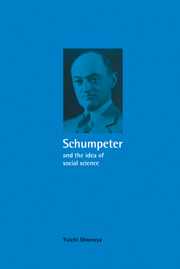Book contents
- Frontmatter
- Contents
- List of figures
- Preface
- 1 Introduction
- 2 Schumpeter and his surroundings: an overview
- 3 The scope and methods of Schumpeter's research program
- 4 The sociology of science and Schumpeter's ideology
- 5 The economic methodology of instrumentalism
- 6 Static economics as an exact science
- 7 The theory of economic development as a midpoint
- 8 A methodology of economic sociology
- 9 Economic sociology as an evolutionary science
- 10 The historical world of economics
- 11 Value judgments and political economy
- 12 Conclusion: Schumpeterian synthesis
- Notes
- List of references
- Index
6 - Static economics as an exact science
Published online by Cambridge University Press: 18 September 2009
- Frontmatter
- Contents
- List of figures
- Preface
- 1 Introduction
- 2 Schumpeter and his surroundings: an overview
- 3 The scope and methods of Schumpeter's research program
- 4 The sociology of science and Schumpeter's ideology
- 5 The economic methodology of instrumentalism
- 6 Static economics as an exact science
- 7 The theory of economic development as a midpoint
- 8 A methodology of economic sociology
- 9 Economic sociology as an evolutionary science
- 10 The historical world of economics
- 11 Value judgments and political economy
- 12 Conclusion: Schumpeterian synthesis
- Notes
- List of references
- Index
Summary
Following on from Schumpeter's economic methodology, this chapter examines how he dealt with economic theory in Das Wesen und der Hauptinhalt der theoretischen Nationalökonomie. By theoretical, pure, or exact economics in Wesen Schumpeter meant specifically the system of general equilibrium analysis. His urgent tasks in pure economics were to clarify the logic of economic phenomena, to establish economics as an “autonomous” science, and to confirm its past achievements in order to advance it further. In his view, if economics could properly define the object of study, weed out impurities from its scope, and explain uniquely an equilibrium state of economy given certain data, it would qualify as a self-contained, independent science. He expected that dynamics would be constructed only on the basis of statics. In order to discuss Schumpeter's economic theory, I shall focus on the following problems, keeping in mind his methodological thought explained in the preceding chapter: how he defined the object and scope of statics, how he systematized the achievements of statics, and how he found a key to constructing dynamics on the basis of statics.
The logic of economic phenomena
The autonomy of pure economics
Today the term autonomous science is scarcely used in economics because there is no longer any doubt that economics is an autonomous science, equipped with its own logic; in fact, the invasion of economic logic into other fields of the social sciences has even been referred to as “economic imperialism.”
- Type
- Chapter
- Information
- Schumpeter and the Idea of Social ScienceA Metatheoretical Study, pp. 124 - 159Publisher: Cambridge University PressPrint publication year: 1997

